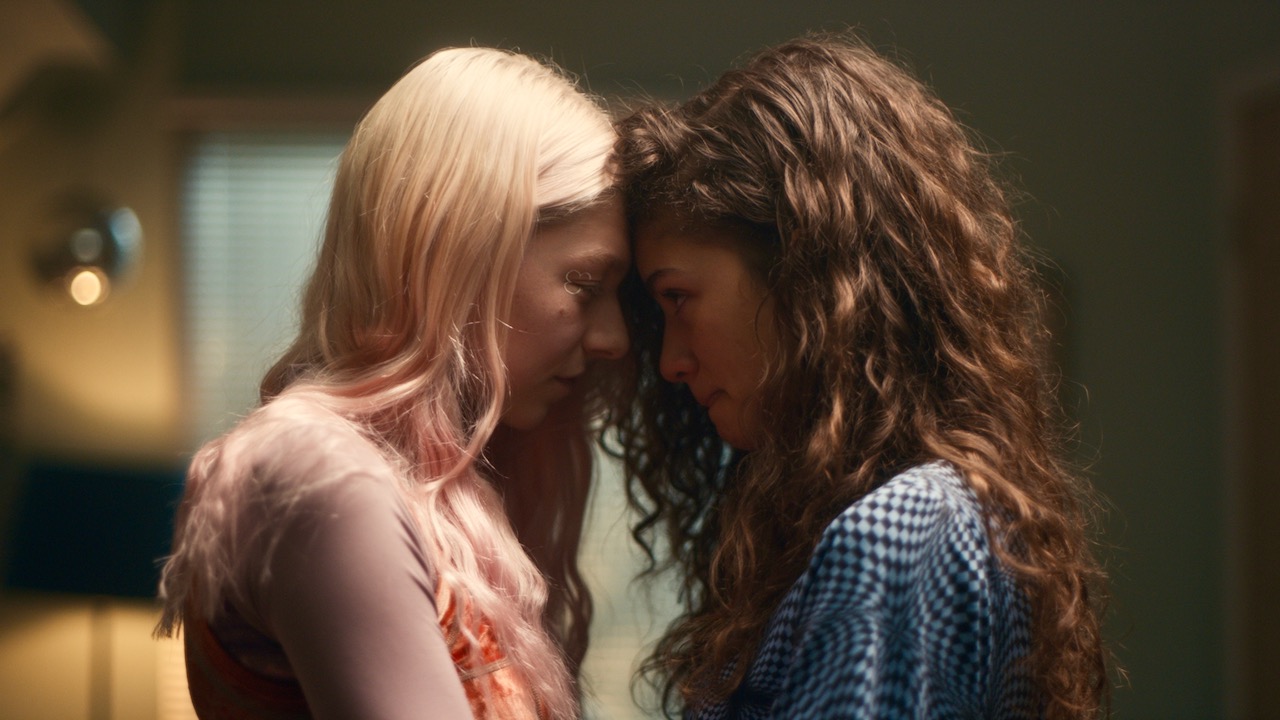Editor’s note: Spoilers ahead for Euphoria’s latest special episode, “Fuck Anyone Who’s Not a Sea Blob.”
I was drunk when I first watched Euphoria last year—every episode of Season 1. I thought it’d be a fun watchthrough, even though I’d heard people talk about the show as intense. I didn’t believe them. HBO’s coming-of-age teen drama features a main character who is an addict (Rue) and another who is a trans woman (Jules), and addiction and transness are subjects that, at baseline, I never expect popular media to tell me anything meaningful about.
And yet, toward the last episodes in particular, the drunk-watching ceased to feel anything like fun or gentle. I’m not usually an ugly-crier, but at the end of the finale—when Jules (Hunter Schafer) whispers “I love you” in a train doorway with her hand wrapped around Rue’s (Zendaya), and then leaves Rue, who later relapses—I ended up horking snot like you only do when you’ve really lost control of yourself, when a piece of art has utterly left you in ruins. I called a friend that night to process what I’d seen, wasted on god knows how much whiskey, sobbing like a child. I don’t remember the last time a fictional story has fucked me up enough to warrant a help-I-need-to-cry phone call.
I’d underestimated Euphoria. I hadn’t expected the show to give me something identifiable about transness or addiction, much less the refracted interactions of those things through murkily visceral portrayals of loneliness, of hurting people you care about, of trappedness and failure and relationships that go sour in ways that rob you so completely, and of the supernova of first love. It seems silly now, but I was really messed up after that final episode.
Is there anything like the burning ocean of a teenage girl in love? Sometimes I think that’s what Euphoria does best. It has a reputation as a dark and gritty show, and fair enough—it’s filled with revenge porn, overdoses, brutal toxic masculinity and a veritable parade of dicks. But I don’t think any of that captures this show’s heart, which is the connection between Rue and Jules—something fragile and warm. Even when their connection leads the two girls to bleak places, the energy underneath it is something genuine, loving and kind.
“Is there anything like the burning ocean of a teenage girl in love? Sometimes I think that’s what Euphoria does best.”
This month, I re-watched Euphoria sober and was accordingly more cognizant and open to its subtleties. Jules has this certain don’t-fuck-with-me stare I only really caught onto this time, a look that contains attitude and fear. It arises both when she’s walking with purpose and when she’s facing down the specter of danger. There are scenes where you can see her shake just a bit as it’s happening, like when she’s lying at the police station or talking to Nate (Jacob Elordi), positioned as a predator, in the park.
Euphoria wants to signal to viewers that Jules’ hardness is more learned than innate—I’m still figuring out how I feel about that choice, but it’s true. In the carnival episode (“Shook Ones, Pt. II”), Nate’s dad Cal (Eric Dane) begs her not to ruin his life by telling anyone they had sex, and it’s obvious from her reaction that Jules had never thought of doing something like that just to hurt him.
The latest addition to the show released this week—a special episode, co-written by Schafer, centres on Jules, who is back home and talking to a therapist (who I couldn’t stand—anyone else?). Spoiler alert: Jules spills about both Rue and her mother Amy, who was a cipher for all of Season 1. We find out Amy was an addict like Rue, that she was an alcoholic and that she relapsed in Season 1, right before the Halloween party (“The Next Episode”). We, the viewers, didn’t know this at the time. Further, we learn that she relapsed after overhearing Jules say she can’t forgive her for abandoning Jules as a child. Jules’ fears about Rue’s sobriety are directly related to trauma from her mother: Jules is both afraid of Rue overdosing again and also resents Rue for feeling like her sobriety is dependent on the state of their relationship. It’s complex, heavy shit.
But Euphoria is too smart to let that translate into anything simplistic when it comes to Jules’ own substance use: At that Halloween party, Jules gets hot-mess-hammered, pulls a fully clothed Rue into a pool and kisses her underwater. And when she later leaves Rue on the train platform, she’s drunk then, too. Does this portend anything for Season 2? I’d be surprised (and disappointed, I suppose) if it doesn’t.
Schafer has always had a commendably steady hand in the writing of her own character, and like last month’s special which centered on Rue, there was a sobriety to this episode in both the literal and meditative sense of the word. It was introspective, muted and dialogue-heavy—bereft of the volatility, violence, sex, highs and pulsing soundtrack that made up Season 1.
Part of this meditative sobriety comes from Jules exploring the fact that she’s a trans woman who likes women. For all the ink spilled about this show, I haven’t seen much media tackle that (Schafer herself being a notable exception). One of the best things about Jules’ character is that the show is increasingly digging its claws into what it means to be a transgender woman who’s also gay.
“My relationship to men is weird,” Jules says late in Season 1 (“The Trials and Tribulations of Trying to Pee While Depressed”). “It’s like, if I can conquer men, then I can conquer femininity.” She reiterates this in the special, but with an added insight. “I wanted to conquer femininity,” she says, “but somewhere along the way, I think femininity conquered me.” Jules looks vulnerable and wary as she says this, and then her usual stone face goes up again. But before it can, she articulates another realization: “I’ve framed my entire womanhood around men.”
“The show is increasingly digging its claws into what it means to be a transgender woman who’s also gay.”
There is an internal, metaphysical component to compulsory heterosexuality’s effect on trans women. The more slippery, complex aspects of this fact is not something I expected to see Euphoria tackle when I tipsily sat down to watch it a year ago. Watching Jules grapple with this is part of what makes her character so deep and touching—and also completely devastating. “Some of the most profound relationships I’ve ever had have been with people I’ve never met,” she tells the therapist, in reference to Tyler, a character she meets on a hook-up app, who, it turns out, doesn’t actually exist. He’s an invention of Nate Jacobs made up to catfish her. But Jules still loves the figure of Tyler, thinks about him, dreams about him. Their sexting, she tells the therapist, was some of the best sex she’s ever had. As for Rue, Jules says, “I’ve never been that close to a girl before.” It all reveals something Euphoria’s long danced around with Jules but, even during her childhood flashbacks, has never quite confronted head on: How, for so much of her life, she has been so fucking alone.
The end of the special brings Rue and Jules together again for a sad, painful reunion. It’s obvious these girls are not only infatuated as teenage lovers are, but they care about each other—like really care about each other—and they might be caring about each other for a long time. I have a heavy, sad feeling for them both.
Season 2 is likely to bring us more heartbreak. That’s the show’s game, and part of Euphoria’s special sauce is that it never lets its beauty and insights leave the house called Stupid Teenagers Doing Stupid Teenager Stuff. And by that token, it looks like we’re going to watch these girls grow up, with all the bleary, raging fucked-up-ness that that growing up will assuredly bring. (Fuuuuuuuuck.) You got me, Euphoria. I’ll watch Season 2 the day it comes out. I’ll start that one without whiskey.
Watch “Fuck Anyone Who’s Not a Sea Blob,” the latest special episode of Euphoria streaming now on Crave (in Canada) and HBO Max (in the U.S.).


 Why you can trust Xtra
Why you can trust Xtra


